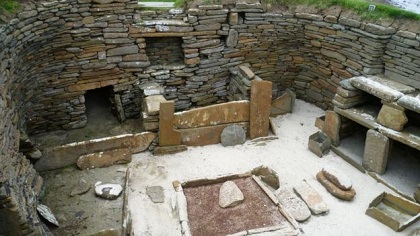Rodents appear to have been roasted for food by Stone Age people as early as 5,000 years ago, archaeological evidence suggests.
Bones from archaeological sites in Orkney show voles were cooked or boiled for food, or possibly for pest control, according to BBC.
This is the first evidence for the exploitation of rodents by Neolithic people in Europe, say scientists.
Rodents were consumed later in history, with the dormouse regarded as a delicacy during Roman times.
The Orkney vole – found only on the archipelago – is thought to be a subspecies of the European common vole.
Charred bones suggest the vole was cooked, most likely for food.
The remains were found with waste products from other foods, suggesting voles may have been roasted in the fire. Alternatively, they may have been cooked or boiled in a pot.
 Protein snack
Protein snack
Dr Jerry Herman, curator of mammals at National Museums of Scotland, said evidence from excavations showed there were large amounts of rodent remains in human dwellings.
This suggests that the piles of bone fragments – mainly from voles but also some field mice – were the result of human intervention of some sort.
“The remains were getting into the refuse of the inhabitants and in very large numbers and over a considerable period of time – several hundred years,” he said.
“Because some of the remains were burnt – we think that they had been roasted – it may be that the inhabitants were actually eating them and that explained how they got into their living space in such numbers.”
The voles were quite small and “would be no more than a mouthful” to eat, but “a perfectly good source of protein”, said Dr Herman.
The remains were originally excavated at the well known Skara Brae site in the 1970s.
Scientists sifted through nearly 60,000 rodent bones and teeth to study their origins.
A recent genetic study on the same samples deduced that the vole was introduced to Orkney direct from what is now Belgium.
It is thought the rodents were brought to the island by sea along with cattle and deer by early farmers or traders.
H.Z

